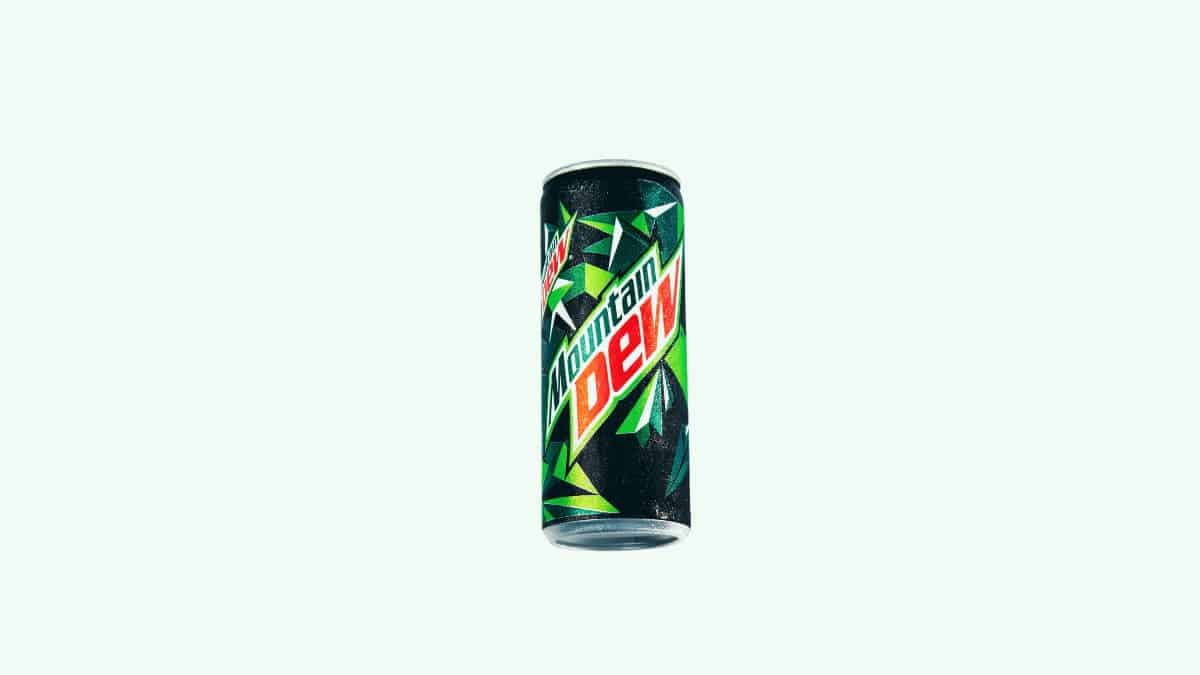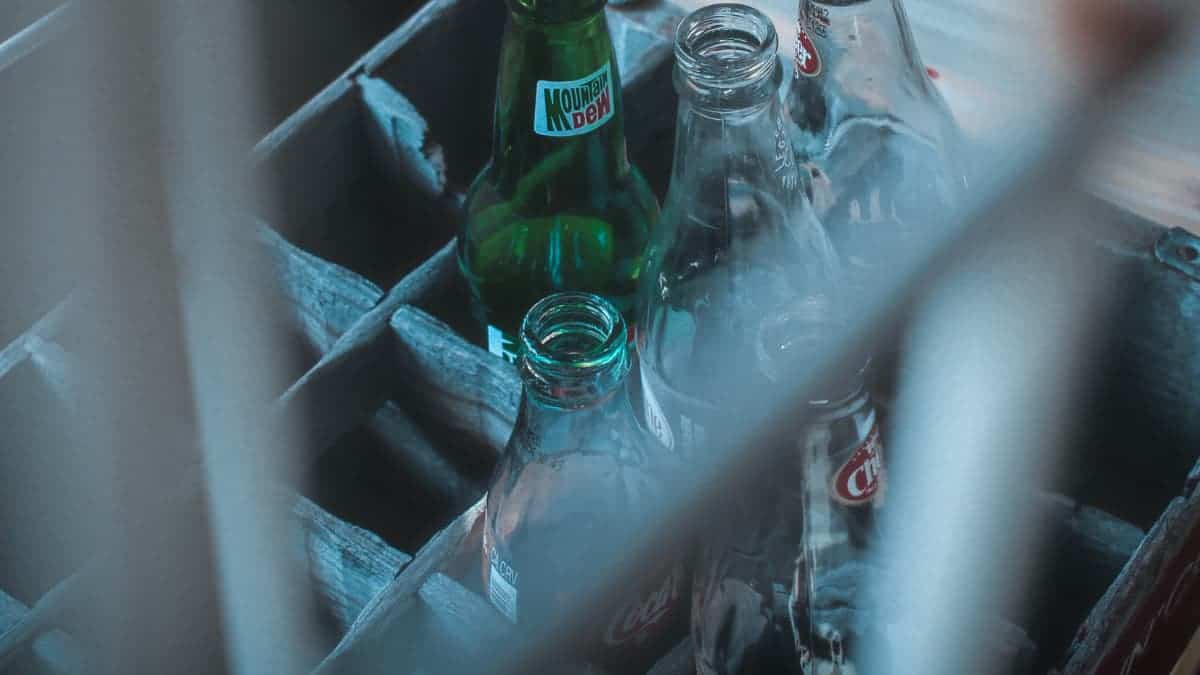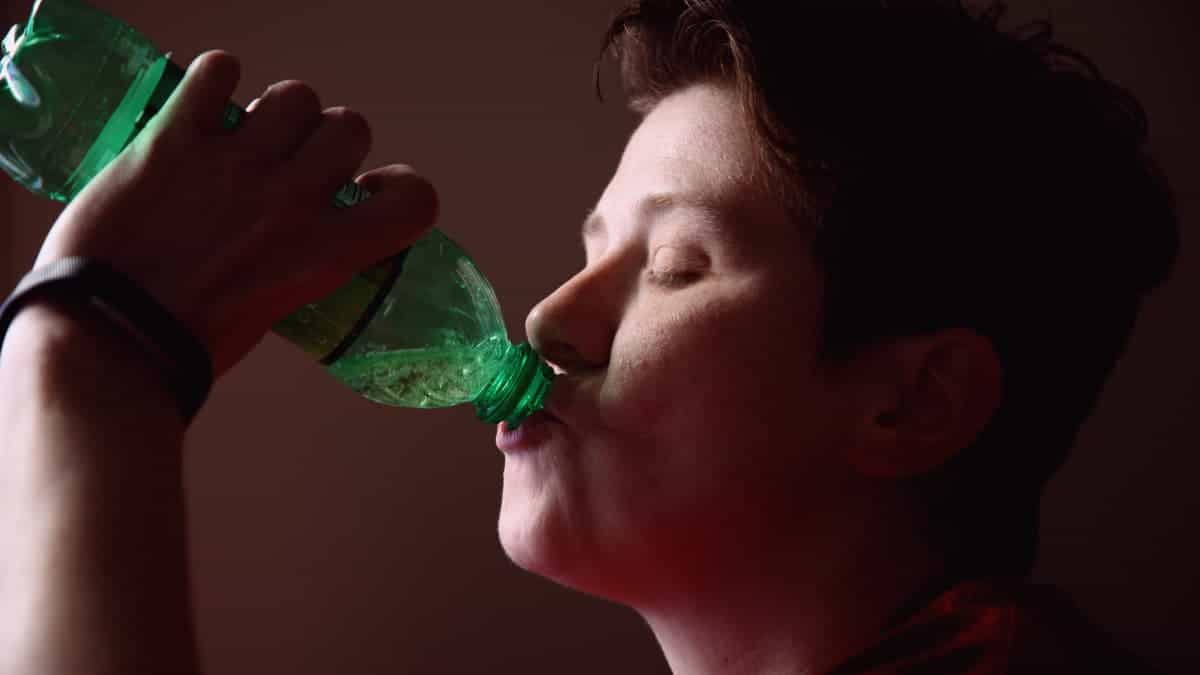How Much Caffeine Is in Mountain Dew?
Mountain Dew, the soda known for its signature neon green color, captured my childhood heart. My friends and I delighted over its syrupy goodness during endless gaming parties.
This soda is still a favorite of mine, and it remains a globally recognized name. If you also like to “do the dew”, read on.
I embarked on a mission to learn more about the drink’s nutritional facts and history. But first, let’s take a look at how much caffeine is in Mountain Dew.

Key Takeaways: Mountain Dew Caffeine Content
- Mountain Dew has less caffeine than coffee.
- Mountain Dew has a greater caffeine content than Coke.
- Mountain Dew contains high sugar content.
Mountain Dew & Caffeine Content
How Much Caffeine Does Mountain Dew Have?
A 12 oz Original Mountain Dew has 54 mg of caffeine. However, the caffeine content varies depending on the type of Mountain Dew.
Surprisingly, a 12 oz can of Mountain Dew Zero Sugar has 68 mg of caffeine.
Want to reduce your sugar intake without upping the caffeine? You might want to go for the Diet Mountain Dew, which has 54 mg of caffeine.
For those who want a Mountain Dew without any caffeine, try a Caffeine Free Mountain Dew. This beverage has 0 mg of caffeine across all serving sizes.
Even though caffeine tastes bitter, there is enough sugar (or sugar substitute) in Mountain Dew to mask its flavor.
Caffeine in Mountain Dew vs Coffee
Does Mountain Dew have more caffeine than coffee? Nope. The amount of caffeine in Mountain Dew is typically less than in an equivalent serving of coffee.
There is around 145 mg of caffeine in an 8 oz cup of drip coffee.
An 8 oz can of Original Mountain Dew has 36 mg of caffeine.
You’ll likely get a sugar rush from guzzling Mountain Dew. But the dew’s caffeine might not affect you in the same way drip coffee would.
If we look at other kinds of coffee and caffeine, java continues to triumph.
For instance, there are about 126 mg of caffeine in espresso. In an 8-ounce serving of instant coffee, there is 57 mg total.
Keep in mind, these are just guidelines. The amount of caffeine in your cup of coffee depends on several factors. These include coffee varietal, brew method, and roast.
Let’s compare light roast vs dark roast. There is typically more caffeine in a standard serving of dark-roasted coffee. However, light roasts have more caffeine than dark roasts.
Huh? How does this work?
Dark roasted beans lose water weight during the roasting process. So, dark roasts have less mass than light roast beans. This results in a higher number of coffee beans per weighted measurement.
Mountain Dew does not have more caffeine than coffee. Unless you get a decaf coffee or decaf espresso.
(That’s not to say that decaf espresso and decaf drip have no caffeine. There is still about 6.2 mg of caffeine in decaffeinated drip coffee.)
So, solely from a caffeine perspective, it might be healthier to drink Mountain Dew. But unlike coffee, this soda contains a ton of sugar and other additives.
For instance, there are 31g total sugars and 40 mg sodium in an 8 oz Mountain Dew. Yikes.
Mountain Dew vs Coke Caffeine Content

How about Mountain Dew vs Coke?
There are 34 mg in a 12 oz can of Coke, compared to 54 mg in a 12 oz Mountain Dew.
The same goes for Diet Coke. There are 46 mg of caffeine in a 12 oz Diet Coke, and 54 mg in a Diet Mountain Dew.
If you are looking for a delicious soda with less caffeine, a Coke might be a good option.
What Is Mountain Dew?
Like most sodas, Mountain Dew is a combination of many questionable ingredients.
Here’s what you’re drinking when you crack open a Mountain Dew:
- Yellow 5
- Calcium Disodium EDTA (to protect flavor)
- Erythorbic Acid (to preserve freshness)
- Gum Arabic
- Sodium Citrate
- Caffeine
- Sodium Benzoate (also to preserve freshness)
- Natural flavor
- Citric acid
- Concentrated orange juice
- High fructose corn syrup
- Carbonated water.
The ingredients list is a bit overwhelming. But one thing in particular stands out. There is so much sugar!
A 12 oz can of Mountain Dew contains 46 g of added sugar. That’s 92% of the daily value.
Who Owns Mountain Dew?
The super-sweet beverage originated in the most unusual of places: the Appalachian mountains.
During the 1940s, two siblings had a grand idea. Ally and Barney Harman worked as beverage bottlers in Tennessee.
According to Knox News, the brothers wanted to create a soda. But not just any soda. They wanted a soda they could mix with bourbon whiskey and moonshine.
After meeting with Bill Jones, a beverage bottler from Virginia, Mountain Dew was born. The first iteration of Mountain Dew contained stronger notes of citrus. It was closer to modern-day Sprite or 7Up.
A chance meeting with an owner of Tri-Cities Beverage lead to nationwide distribution.
During the 1950s, the citrusy soda transformed into a syrupy soda more familiar to the one we enjoy today.
Pepsi purchased the Tip Corporation and Mountain Dew in 1964. They expressed a desire to build upon the image of Mountain Dew.

At the time, the soda was characterized as having “hillbilly appeal”. During a convention in 1964, Pepsi even constructed a “hillbilly” cabin to market the soda.
That marketing campaign soon ended, and Pepsi shifted to an urban audience. Pepsi continues to change the image of Mountain Dew to keep up with contemporary trends.
Wrapping Up
Mountain Dew transformed from rich country roots into the sweet soda we know today.
Sugar content aside, Mountain Dew contains less caffeine than a regular cup of coffee. Looking at Mountain Dew vs Coke, there is less caffeine in Coke.
So yes, in terms of caffeine content, Mountain Dew offers a middle ground between coffee and Coke. But you might be more concerned about its high sugar content. Ya-Hoo!

